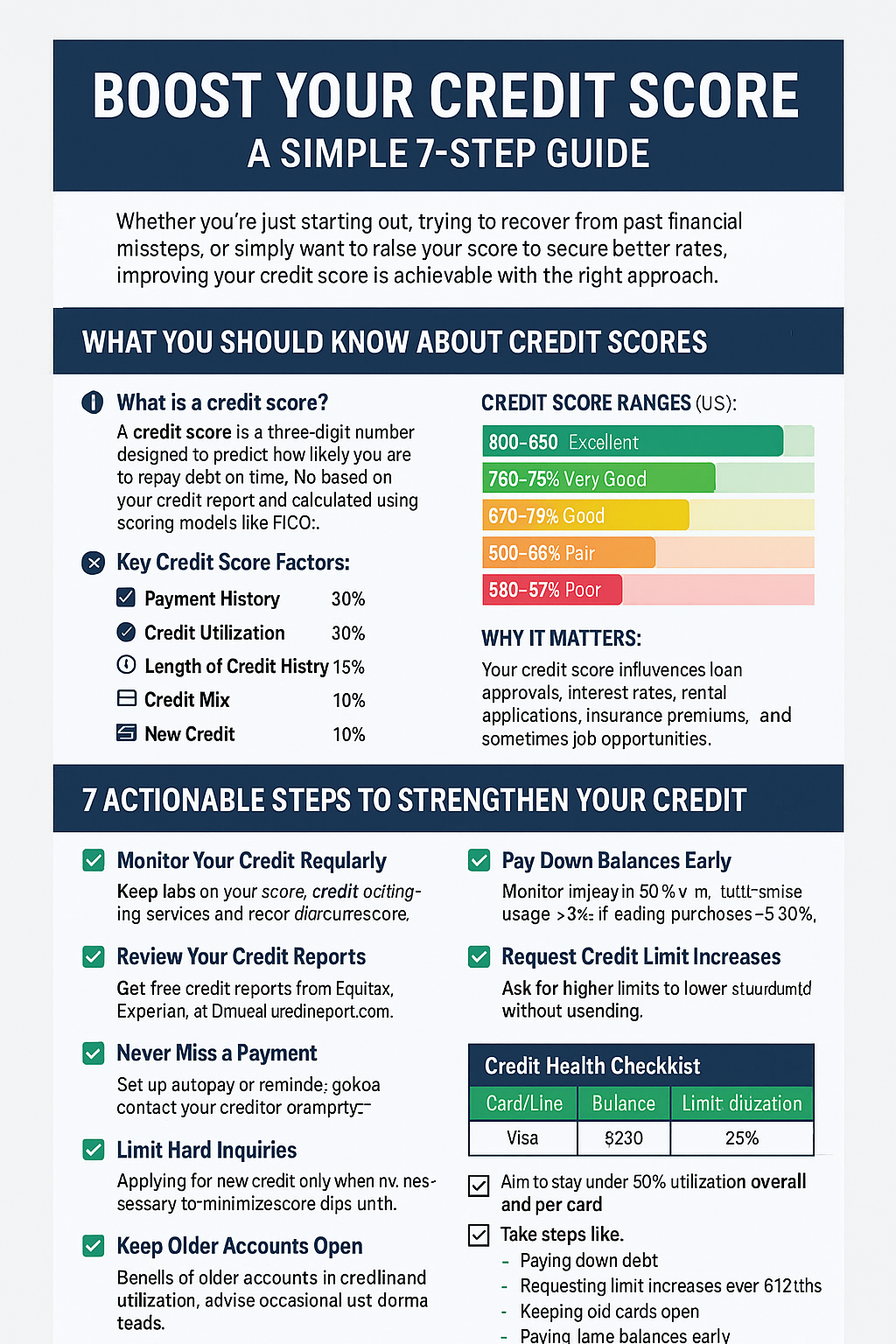Boost Your Credit Score: A Simple 7-Step Guide

Whether you’re just starting out, trying to recover from past financial missteps, or simply want to raise your score to secure better rates, improving your credit score is achievable with the right approach.
What You Should Know About Credit Scores
What is a credit score?
A credit score is a three-digit number designed to predict how likely you are to repay debt on time. It’s based on your credit report and calculated using scoring models like FICO®.
Key Credit Score Factors:
- Payment History (35%) – Consistently paying on time is crucial.
- Credit Utilization (30%) – The percentage of available credit you're using.
- Length of Credit History (15%) – Older accounts help your score.
- Credit Mix (10%) – A variety of credit types (cards, loans) is beneficial.
- New Credit (10%) – Too many recent applications can hurt your score.
Credit Score Ranges (U.S.):
- 800–850: Excellent
- 740–799: Very Good
- 670–739: Good
- 580–669: Fair
- 300–579: Poor
Why It Matters:
Your credit score influences loan approvals, interest rates, rental applications, insurance premiums, and sometimes job opportunities.
7 Actionable Steps to Strengthen Your Credit
1. Monitor Your Credit Regularly
Sign up for a credit monitoring service to keep tabs on your score. You can get your score for free from:
- U.S.: Credit Karma, Experian
- Canada: Borrowell, Credit Karma
- UK: ClearScore, Credit Karma
- Australia: MoneySmart
Record your current score to track your progress.
2. Review Your Credit Reports for Errors
You're entitled to a free report annually from each major bureau: Equifax, Experian, and TransUnion (visit AnnualCreditReport.com). Look for:
- Mistaken accounts
- Incorrect balances
- Outdated negative marks (older than 7 years)
Dispute inaccuracies directly with the bureaus or data furnishers using these resources:
3. Never Miss a Payment
Set up autopay or reminders to ensure you always meet at least the minimum due. If you miss a payment, contact your creditor right away to make it right and request that they don’t report it.
4. Limit Hard Inquiries
Only apply for new credit when truly necessary. Each application can drop your score slightly and signal risk to lenders. Avoid impulsive sign-ups at stores just for discounts.
5. Keep Older Accounts Open
Even unused accounts contribute positively by:
- Extending your credit history
- Increasing your total credit limit (thus lowering utilization)
Use dormant cards occasionally and pay off the balance to keep them active and in good standing.
6. Pay Down Balances Early
Instead of waiting until your due date, pay part or all of your balance mid-cycle—especially after big purchases. This keeps your utilization ratio low when it’s reported to bureaus.
Aim for less than 30% usage on each card and across all credit lines. For example:
- $1,000 balance / $5,000 limit = 20% utilization
7. Request Credit Limit Increases
If your financial situation supports it, ask for higher limits to instantly lower your credit utilization—without spending more. Just confirm whether your issuer will do a hard pull, which may temporarily lower your score.
Credit Health Checklist (Inspired by the PDF)
✅ Set up credit monitoring and log your starting score
✅ Identify negative score factors (e.g., too many inquiries) and create a plan
✅ Order and review reports from all bureaus
✅ Dispute any false or outdated information
✅ Understand and manage your credit utilization:
|
Card/Line |
Balance |
Limit |
Utilization |
|
Visa |
$230 |
$1,000 |
23% |
✅ Aim to stay under 30% utilization overall and per card
✅ Take steps like:
- Paying down debt
- Requesting limit increases every 6–12 months
- Keeping old cards open
- Paying large balances early
Improving your credit score won’t happen overnight, but consistent actions over time will yield meaningful results. If you stick to these steps, your score will gradually improve—and so will your financial opportunities.
Categories
Recent Posts











"My job is to find and attract mastery-based agents to the office, protect the culture, and make sure everyone is happy! "

